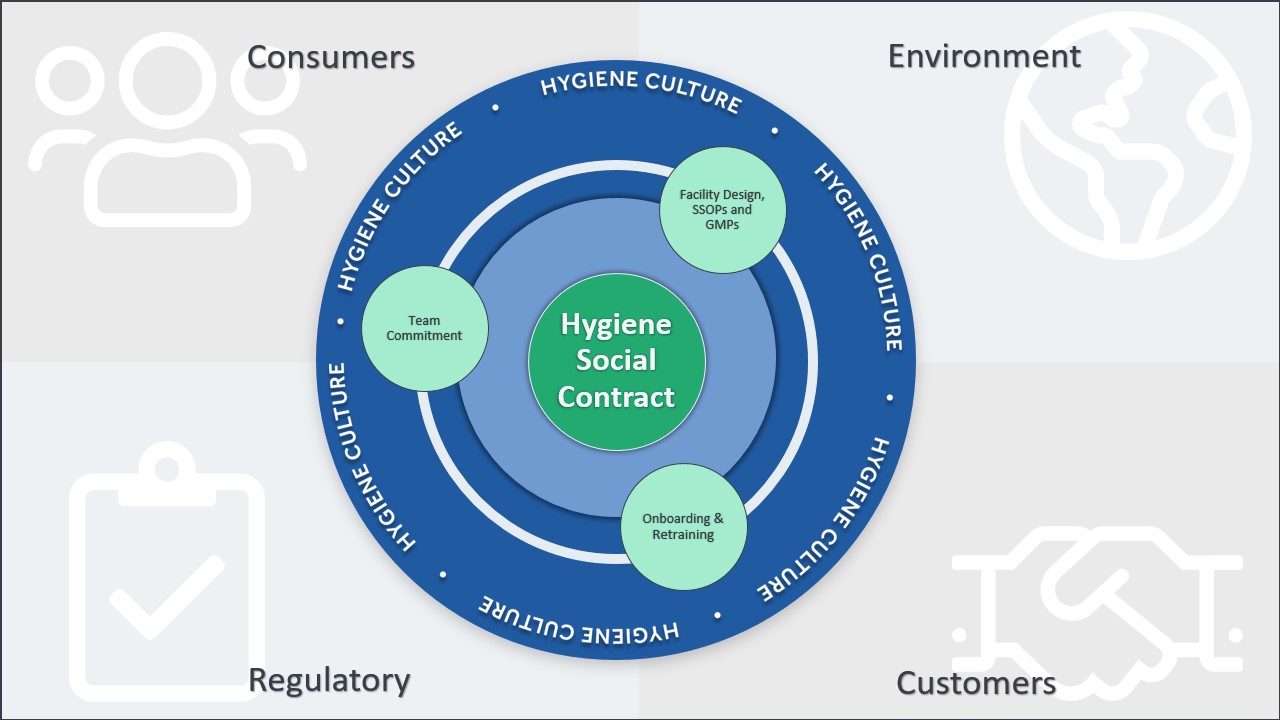What is a Food Safety Culture and Why is it Important?
Unquestionably, food safety is a primary focus for every food manufacturer. However, while a lot of effort is put into food safety processes and procedures, many of these don’t account for a key risk: human behavior. This is where creating a food safety culture based around hygiene can help.
This is the first post in our series on food safety culture, you can read the other posts here:
2. What can impact a food safety culture?3. How to create a food safety culture
4. Maintaining and reinforcing a food safety culture
What is a food safety culture?
A food safety culture is a unified mindset across the organization that puts food safety at the forefront of everything done within the business, both physically and mentally. If an effective food safety culture (AKA a “hygiene culture” in the diagram below) is in place, everything from the layout and design of a facility to how an employee thinks about their own personal hygiene, should all be considered through the lens of food safety.

Why is creating a food safety culture important?
Creating a food safety culture is important for many reasons, including but not limited to:
Meet regulatory standards with a food safety culture
Meeting mandatory USDA FSIS and FDA FSMA regulations, exceeding food safety standards like Safety Quality Food (SQF) and BRCGS, as well as passing 3rd party food safety audits by certification programs from organizations like NSF International are at the core of most processes and procedures in food manufacturing. A food safety culture helps bring written processes and procedures and hygiene best practices to reality by ensuring that upholding food safety standards is at the core of every decision or action by individuals in the organization.
Prevent recalls with a food safety culture
According to a joint industry study by the Food Marketing Institute and the Grocery Manufacturers Association, the average cost of recall to a food company is $10 Million in direct costs, lost sales and brand equity deterioration. However, all of the costs and efforts associated with tracking a tainted product through the food chain, lost customer sales, and lost brand confidence with consumers could be avoided by having a food safety culture at your organization. A food safety culture helps every member of the organization from the executive who would be directly impacted by a costly recall to the production team member just clocking into work, feel accountable for ensuring the quality and safety of food products.
Protect your Consumers with a Food Safety Culture
-1.jpeg?width=300&name=AdobeStock_133781443%20(1)-1.jpeg) One of the most important things that a food safety culture can do for your organization is protect your consumers. At its core, a food safety culture empowers every member of the organization to create sustainable, healthy food they are comfortable serving to not only their consumers, but also their families.
One of the most important things that a food safety culture can do for your organization is protect your consumers. At its core, a food safety culture empowers every member of the organization to create sustainable, healthy food they are comfortable serving to not only their consumers, but also their families.
This is just the first post about food safety culture. In future posts, we’ll also explore what can impact a food safety culture and how to create one at your organization, starting with a hygiene social contract. However you can start creating your food safety culture today by registering for the Employee Hygiene Toolbox - a content partnership brought to you by Meritech and Food Safety Magazine with educational content and downloadable tools and guides designed to help you design and implement a food safety culture at your facility!







